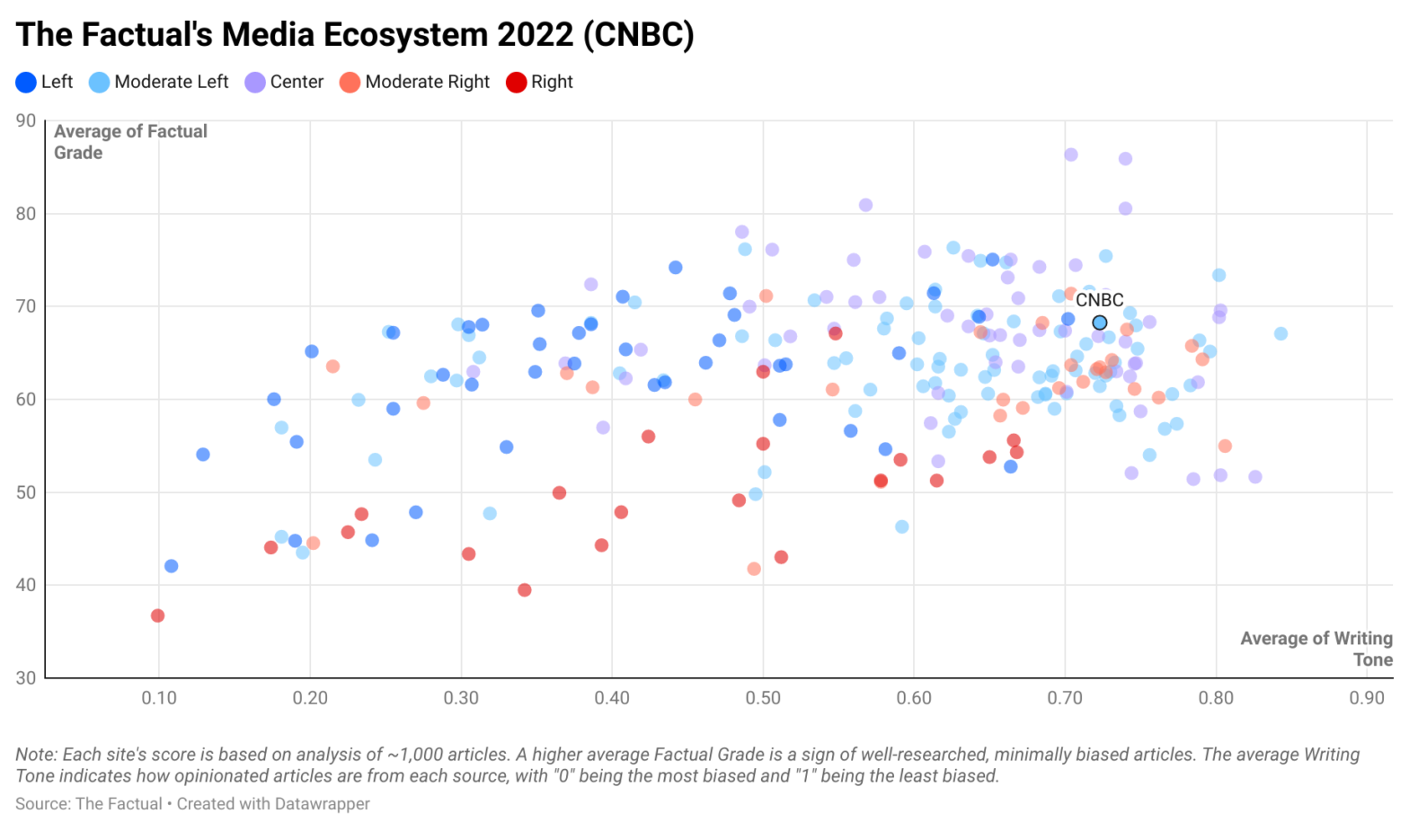Perhaps best known for its television presence, the business news network CNBC also has a large and growing online presence. In 2020, CNBC logged an average 84.9 million unique monthly users and 1.92 billion total video starts. But as a member of what some have termed “mainstream” media — alongside outlets like ABC, NBC, and CBS — CNBC has also had to contend with accusations of having a liberal bias. So, how reliable and biased is CNBC’s news coverage?
Note: This analysis is specific to online written content from CNBC, not its television or other media presence.
How Does The Factual Rate News Sources?
The Factual analyzes more than 10,000 news stories every day to help readers find the most informative, least-biased articles. Our news-rating algorithm scores each article along four metrics: (1) cited sources and quotes, (2) publication history, (3) writing tone, and (4) author expertise. These scores combine in a weighted average we call a Factual Grade, which ranges from 0–100%. (See our How It Works page to learn more about our algorithm.)
For this study, we analyzed ~1,000 articles each from 240 news sources. The average Factual Grade for the entire dataset was 62.5%. Based on these averages, we can compare the performance of news sites across the media ecosystem. The entire dataset can be explored in greater detail here.
How Factual Is CNBC?
CNBC scored an average Factual Grade of 68.3%, placing the site in the 77th percentile of our dataset. This is above many other similar “mainstream” news outlets such as ABC News (67.7%), NBC News (62.8%), and CBS News (61.4%).
CNBC obtains a high overall score due to consistent performance along The Factual’s key metrics. CNBC employs dedicated journalists to cover specific topics such as health, national security, and U.S. politics, leading to high author expertise scores. Many articles offer extensive evidence, including external links to a diverse range of sources and directly quoted material. Finally, the site tends towards neutral language in reporting, including in neutrally worded headlines.
Like any news source, scores for articles from CNBC varied widely based on factors like author expertise and cited evidence. For example, some scored above 80%, while others scored below 60%.
Please check your email for instructions to ensure that the newsletter arrives in your inbox tomorrow.
How Opinionated Is CNBC?
One of the metrics The Factual uses is the Writing Tone, which measures how opinionated the writing is in an article. For this metric, the algorithm looks for signs of subjective commentary (e.g., first person pronouns and unnecessary adverbs), as well as the emotional nature of selected words, and sees how prevalent they are for a given length of text. More neutral text receives higher ratings, with “0” being the most opinionated and “1” being the most neutral.
CNBC had an average Writing Tone score of 0.72, placing it in the 81st percentile in our dataset for this metric. This suggests that articles from CNBC tend to use neutral language in most articles, avoiding emotionally loaded or sensational wording. This is evident in neutrally worded headlines such as “Jobless claims edge lower as Fed looks to cool labor market” and “Pending home sales drop 1% in July.”
What Is CNBC’s Political Bias?
The Factual classifies news sites by political bias as either Left, Moderate Left, Center, Moderate Right, or Right. This classification is derived from third-party assessments from media bias organizations such as AllSides and Media Bias/Fact Check (MBFC). Based on this data, The Factual assigns CNBC a Moderate Left bias.
MBFC assigns CNBC a “Left-Center” bias due to story selection that slightly favors the left. Sources in this category exhibit a slight liberal bias and may use loaded words to favor liberal causes. MBFC also classifies CNBC as “Mostly Factual” due to two failed fact-checks in recent memory (both related to Covid-19). However, the site receives credit for high-quality sources in their reporting.
AllSides assigns CNBC a “Center” rating, but does not appear to have conducted a thorough analysis of the site to date. This rating is corroborated by 10,207 community ratings and independent research, but AllSides indicates “low or initial rating confidence in this bias rating.”
Please check your email for instructions to ensure that the newsletter arrives in your inbox tomorrow.
Who Owns CNBC?
CNBC is owned by NBC Universal, and ultimately the parent company Comcast. CNBC’s revenue is largely derived from advertising and subscription fees. Documents from OpenSecrets.org suggest that campaign contributions from affiliates of Comcast generally favor Democratic candidates, particularly in election years. Most recently, Comcast joined other major companies in cutting off all campaign contributions to “the 147 Republican politicians who voted against accepting the presidential vote totals” in the 2020 presidential election. However, there is not strong evidence that CNBC’s ownership has a large impact on the political bias of its news coverage.
Why Does It Matter?
News articles always have some bias because all authors have some frame of reference within which they describe a story. Political bias ratings are helpful in understanding this framing. However, it can be more beneficial to know how factual an article is based on quantifiable metrics that can be seen across the media ecosystem, such as cited evidence, author expertise, and writing tone. This is what The Factual ascertains.
Reading several, highly rated articles from across the political spectrum helps counter the bias of any news source or story. To have the day’s most factual news stories delivered to your inbox every morning, subscribe to our daily newsletter.
Article updated on September 15, 2022 to reflect new data.

